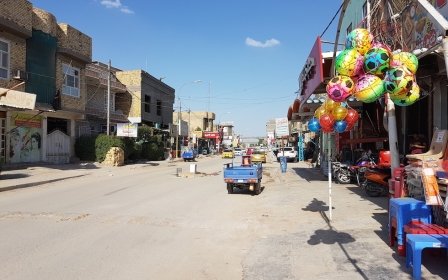Sadrist-Communist alliance set for victory as PM Abadi calls for cooperation

BAGHDAD - Prime Minister Haider al-Abadi has promised to work with the winner of Iraq's parliamentary elections, as the final results named the Sairoun Alliance, backed by cleric Muqtada al-Sadr and the Iraqi Communist Party, as the party with the most votes.
Preliminary results were based on a count of more than 91 percent of the votes cast in 16 of Iraq's 18 provinces. Sairoun did not stand in the last two provinces to be counted, Duhok and Kirkuk, both of which are facing delays over voting disputes.
Despite being third in the running, Abadi could still potentially remain prime minister after a coalition government is formed, a process that must take place within 90 days.
"We are ready to work and cooperate in forming the strongest government for Iraq, free of corruption," Abadi said, referring to the issue that has been at the forefront of most voters' minds.
Saturday's election was the first since the defeat of the Islamic State (IS) group, but the turnout fell far short of previous elections with only 44.52 percent of registered voters participating.
Reports indicate that Sairoun won the national popular vote with more than 1.3 million votes, gaining 54 seats in parliament out of a total of 329.
However, Sairoun is not certain to form the next government, but will have to negotiate a coalition to secure a parliamentary majority.
In a statement, Sadr expressed a willingness to work with a number of parties - among those he named were al-Hikma, al-Wataniya, and the Kurdish parties Gorran and New Generation. No mention was made of the State of Law Coalition or Fatah Coalition, two groups heavily aligned with Iran.
The Fatah Coalition, which is composed of members of the paramilitary Hashd al-Shaabi, got 47 seats, while the State of Law Coalition led by former prime minister Nouri al-Maliki, came in fourth with 25 seats.
In Monday's early hours, Iraqis celebrated in Baghdad's Tahrir Square as early results from Saturday's elections indicated that the Sairoun Alliance was on course for victory.
Crowds chanted: "Iran is out, Iraq is free" as the anti-corruption, anti-sectarian coalition looked set to be kingmakers, if not outright winners, in an otherwise poorly attended election.
The outcome is likely to alarm both of Iraq's primary sponsors, the US and Iran, as the coalition adopted a strictly nationalist position, rejecting the influence of external powers.
As results were still coming in, Sadr made a sideswipe against Washington over the decision to move its embassy to Jerusalem, the official inauguration of which took place on Monday.
“Another disgrace to colonialism and global arrogance with the opening of the evil American building in Jerusalem the most sacred in Palestine the courageous and jihad,” Sadr said in a tweet.
“This is just another proof of US harming and damaging peoples, and the US support for the Israeli entity and its hostility to the Abrahamic religions."
Shock in Tehran and Washington
But Sadr has been equally as antagonistic to Iran, as he repeatedly condemned its meddling in Iraq and Syria, making him stand out among Shia leaders in calling for Syrian President Bashar al-Assad to resign.
Ali Akbar Velayati, top adviser to the Islamic Republic's Supreme Leader Ali Khamenei, warned in February that he would "not allow liberals and communists to govern in Iraq," a reference to the Iraqi Communist Party
Voters had complained that most of the candidates running were 'the same faces' who they blamed for corruption and unemployment.
In contrast, the Sairoun Alliance had new candidates, and Sadrists who had previously been involved in the Iraqi government and accused of corruption were specifically excluded.
Nevertheless, the majority did not vote, partly due to a boycott campaign spearheaded online by activists.
One Baghdad resident, who initially told Middle East Eye he would not be voting, cited Sadr's anti-establishment message as motivation for boycotting the election.
"As Muqtada says, they are all thieves," said Murtada, a shop worker in the Khadamiya district. "I cannot give my vote to a thief."
He later conceded he would "have to give my vote to Sairoun".
Raid Jahed Fahmi, head of the Communist Party and a parliamentary candidate for the Sairoun Alliance, told Middle East Eye shortly before the election that the alliance's programme was of a "national character" - not tribal or sectarian - and that was the crux of its appeal.
"Our programme's objective is the creation of a citizen’s state, a state that builds institutions with policies geared towards social justice, is against the [sectarian] quota-based power-sharing system and is for an independent Iraq, a sovereign Iraq, [that is] against the meddling of any foreign power in its internal affairs," he said.
"It creates a new possibility [and] a new perspective to deal with the issues that did not exist before, so really it will have an impact well beyond the elections."
Middle East Eye propose une couverture et une analyse indépendantes et incomparables du Moyen-Orient, de l’Afrique du Nord et d’autres régions du monde. Pour en savoir plus sur la reprise de ce contenu et les frais qui s’appliquent, veuillez remplir ce formulaire [en anglais]. Pour en savoir plus sur MEE, cliquez ici [en anglais].




